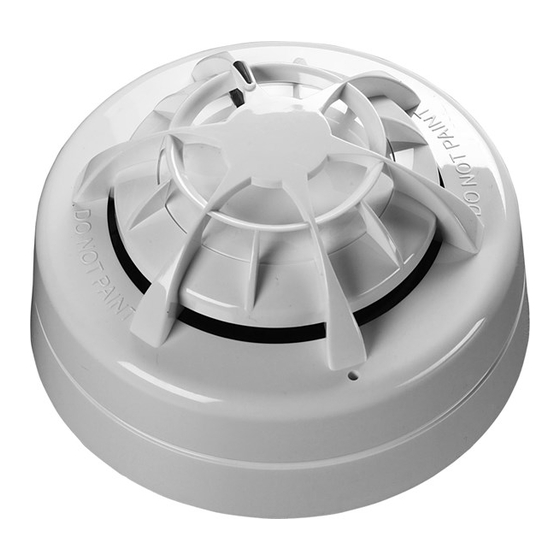Apollo ORB-HB-00020-APO Manual del producto - Página 10
Navegue en línea o descargue pdf Manual del producto para Sensores de seguridad Apollo ORB-HB-00020-APO. Apollo ORB-HB-00020-APO 17 páginas. Orbis series
También para Apollo ORB-HB-00020-APO: Manual del producto (16 páginas)

ORBIS
WHERE TO USE HEAT
DETECTORS
Heat detectors are used in applications
where smoke detectors are unsuitable.
Smoke detectors are used wherever
possible since smoke detection provides
earlier warning of fire than heat detection.
10
There are, however, limits to the
application of smoke detectors and these
are described in the section 'features of
Orbis' on page 4.
Heat detectors should be used if there is
a danger of nuisance alarms from smoke
detectors.
Fig. 3
ORBIS HEAT DETECTOR
The Orbis range incorporates seven heat
detector classes to suit a wide variety of
operating conditions in which smoke
detectors are unsuitable.
The European standard EN54-5:2001
classifies heat detectors according to the
highest ambient temperature in which
they can safely be used without risk of
false alarm. The classes are identified by
the letters A to G. (Class A is subdivided
into A1 and A2.) In addition to the basic
classification, detectors may be identified
Choosing a heat detector
USE A1S or A2S
© Apollo Fire Detectors Limited 2004-6/RHD
ORBIS
HEAT
DETECTOR
Part Number ORB-HT-11001-APO
by a suffix to show that they are rate-of-
rise (suffix R) or fixed temperature (suffix
S) types.
All heat detectors in the Orbis range are
tested as static or rate-of-rise detectors
and are classified as A1R, A1S, A2S, BR,
BS, CR and CS.
Heat Detector Response Modes
Class
Application
(EN54–
Temperature
5:2001)
Typical Max
A1R
25
50
A1S
25
50
A2S
25
50
BR
40
65
BS
40
65
CR
55
80
CS
55
80
Table 1
Static Response
Temperature °C
Min
Typ
Max
54
57
65
54
57
65
54
61
70
69
73
85
69
73
85
84
90
100
84
90
100
